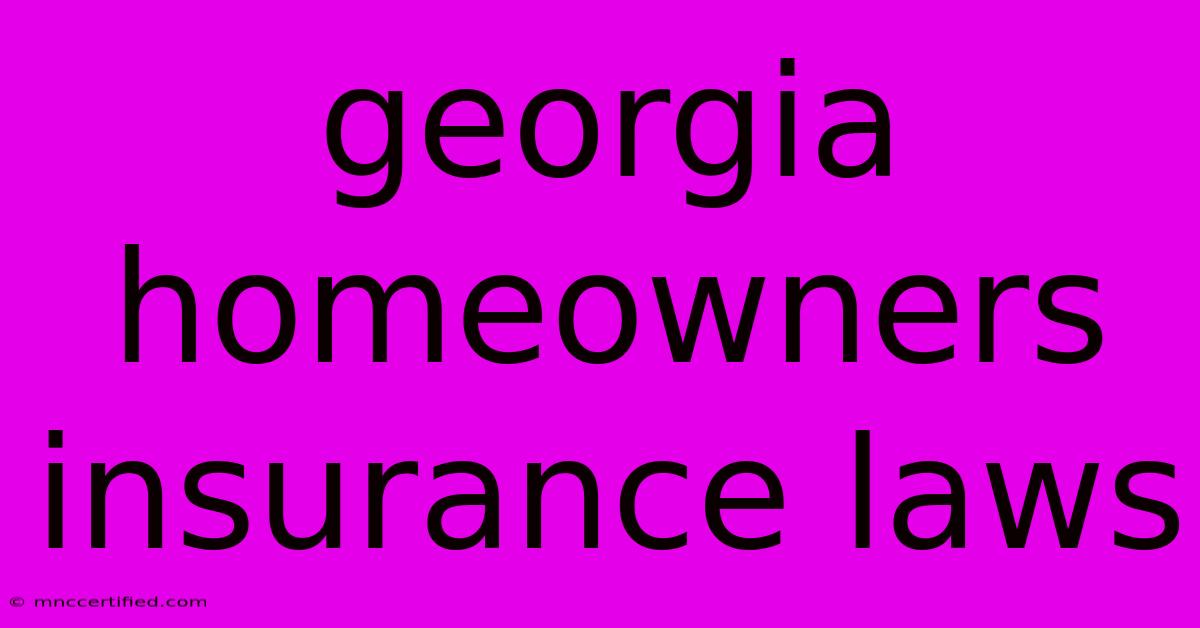Georgia Homeowners Insurance Laws

Table of Contents
Georgia Homeowners Insurance Laws: A Comprehensive Guide for Homeowners
Buying a home is a significant investment, and protecting that investment with the right homeowners insurance is crucial. Georgia, like all states, has specific laws and regulations governing homeowners insurance. Understanding these laws is vital for ensuring you have adequate coverage and avoiding potential pitfalls. This comprehensive guide will delve into the key aspects of Georgia homeowners insurance laws.
Understanding Georgia's Insurance Market
Georgia's homeowners insurance market is competitive, offering a variety of policy options from numerous insurers. However, this competitive landscape doesn't negate the importance of understanding your rights and responsibilities as a homeowner. The Georgia Department of Insurance (DOI) plays a crucial role in regulating the industry, ensuring fair practices and protecting consumers.
Key Roles of the Georgia Department of Insurance:
- Consumer Protection: The DOI investigates complaints against insurance companies and works to resolve disputes between insurers and policyholders.
- Market Regulation: The DOI sets standards for insurance policies, ensuring they meet minimum requirements for coverage and clarity.
- Financial Stability: The DOI monitors the financial stability of insurance companies operating in Georgia, helping to prevent insolvencies.
Essential Components of a Georgia Homeowners Insurance Policy
A standard Georgia homeowners insurance policy typically includes coverage for several key areas:
- Dwelling Coverage: This protects the physical structure of your home against damage from covered perils like fire, wind, and hail. Understanding the specific perils covered is crucial. Review your policy carefully!
- Personal Property Coverage: This covers your belongings inside your home, from furniture and electronics to clothing and jewelry. Consider adding scheduled personal property coverage for high-value items.
- Liability Coverage: This protects you financially if someone is injured on your property or you cause damage to someone else's property. Adequate liability coverage is essential.
- Additional Living Expenses (ALE): If your home becomes uninhabitable due to a covered peril, ALE covers the costs of temporary housing and living expenses.
- Medical Payments Coverage: This covers medical expenses for guests injured on your property, regardless of fault.
Understanding Exclusions and Limitations
While homeowners insurance provides valuable protection, it's essential to understand what isn't covered. Common exclusions include:
- Flood Damage: Flood insurance is typically purchased separately through the National Flood Insurance Program (NFIP).
- Earthquake Damage: Earthquake coverage often requires a separate endorsement.
- Insect or Vermin Damage: Gradual damage caused by insects or vermin is usually not covered.
- Neglect or Intentional Damage: Damage caused by negligence or intentional acts is generally excluded.
Navigating Claims in Georgia
Filing a claim involves several steps. Familiarize yourself with your policy's claims process:
- Report the Damage Promptly: Contact your insurance company as soon as possible after an incident.
- Document the Damage: Take photos and videos of the damage.
- Cooperate with the Adjuster: Provide all necessary information to the insurance adjuster.
- Review the Claim Settlement: Carefully review the settlement offer to ensure it accurately reflects the damage.
If you disagree with your insurer's decision, you can file a complaint with the Georgia Department of Insurance.
Finding Affordable Homeowners Insurance in Georgia
The cost of homeowners insurance in Georgia varies depending on several factors:
- Location: Areas prone to natural disasters generally have higher premiums.
- Home Value: Higher-valued homes typically have higher premiums.
- Credit Score: Your credit score can impact your insurance rates.
- Coverage Amount: Higher coverage amounts mean higher premiums.
Shopping around and comparing quotes from multiple insurers is crucial to finding the most affordable and suitable coverage.
Key Takeaways: Protecting Your Investment
Understanding Georgia's homeowners insurance laws empowers you to protect your significant investment. Regularly review your policy, understand your coverage, and don't hesitate to contact the Georgia Department of Insurance if you have any questions or concerns. By taking these steps, you can ensure you have the right protection for your home and peace of mind.
Disclaimer: This article provides general information about Georgia homeowners insurance laws. It is not intended as legal or financial advice. Consult with a qualified insurance professional for personalized guidance.

Thank you for visiting our website wich cover about Georgia Homeowners Insurance Laws. We hope the information provided has been useful to you. Feel free to contact us if you have any questions or need further assistance. See you next time and dont miss to bookmark.
Featured Posts
-
Gyno Surgery Covered By Insurance
Nov 19, 2024
-
Wasps Defeat Super Eagles Highlights
Nov 19, 2024
-
Carpenters Union Vision Insurance
Nov 19, 2024
-
Sell Medicare Insurance From Home
Nov 19, 2024
-
Paul Teal Dead One Tree Hill Star Dies
Nov 19, 2024